take a look at this video. https://t.co/zPKuZRNaoy
The short version is, no, we don't@louisgray @PRNews @JohnMu— Gary 鯨理/경리 Illyes (@methode) June 7, 2016
Do Social Media Links Help SEO?

One of Google employees stated that social media has no direct impact on website positions, and “social signals” aren’t taken into account by Google. But does it actually mean that social media links are completely useless and don’t support the SEO process? Keep reading to discover what specialists actually think about it.
Table of contents:
- What Do We Know About Social Media Links and SEO? A Few Facts
- Social Media Links to Your Site – How Do They Affect SEO? 3 Facts
- SEO Benefits of Social Media Links
- What is the Key to Effective Promotion of a Website in Social Media? SEO Perspective
- Social Media Links and SEO – The Takeaway
In the SEO industry, experts have been wondering for a long time whether social media platforms have any impact on website positions in the search results. Many people think that social media link building isn’t the best idea, as such platforms only allow nofollow links that don’t pass the link juice to other, external pages.
It’s true that it’s hard to find social media that makes it possible to place dofollow links (i.e. those that pass the power of the site on), but for reasons we’ll discuss next, you should still take SM platforms into account.
More and more specialists talk about the so-called social linking or social SEO, which are methods of acquiring links from social media to support SEO.
So, the question is do social media links help SEO?
What Do We Know About Social Media Links and SEO? A Few Facts
Over the past few years, Google has changed its attitude towards the SEO importance of social media links several times.
Initially, Google claimed that social media was important (Does Google use data from social sites in ranking?), and then in 2014 another video featuring Matt Cutts (Are pages from social media sites ranked differently?) was released and debunked this concept, reporting that the so-called social signals (i.e. Facebook likes, Instagram followers) don’t affect rankings.
Since then, many studies and tests have managed to report that while social media on its own is not directly a ranking factor, it affects many crucial parameters.
It also needs to be pointed out that Forbes mentions that social media platforms like Facebook, Twitter, or Instagram are regularly crawled by search engine robots, including, of course, Google robots (unless the content is only available to logged-in users of private groups).
The impact of social media on algorithms still isn’t clear.
Although sharing links on social media won’t make a huge difference to SEO, properly guided link-building makes sense. In 2017, Gary Illyes stated that:
The context in which you engage online, and how people talk about you online, actually can impact what you rank for.
This implies that social media have an impact on search engine rankings. After all, where else can you showcase your brand so effectively?
Therefore, while these two branches of marketing (SEM and SEO) aren’t related directly, they can influence one another in a number of ways. How? Keep reading to find out!
Social Media Links to Your Site – How Do They Affect SEO? 3 Facts
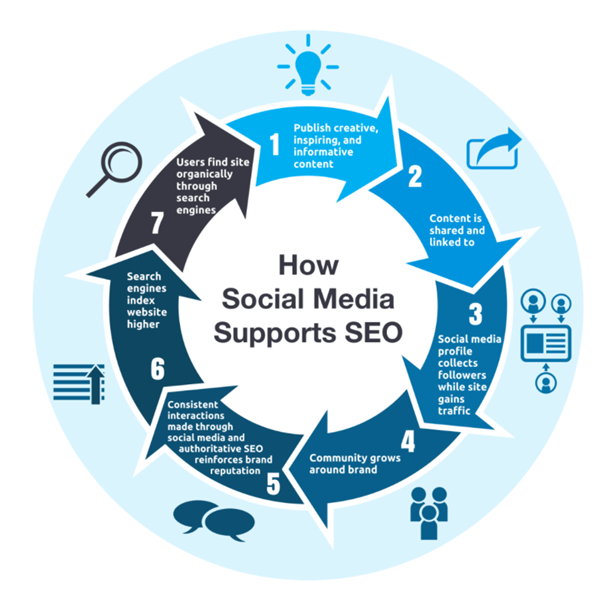
SM May Not Be a Ranking Factor, But It’s a Valuable Link Building Base
It’s commonly known that social media isn’t a ranking factor – this is confirmed by Google, but it doesn’t mean that you should disregard the importance of social media in the link building process.
After all, the fact that the number of shares and other similar social signals doesn’t necessarily matter (as indicated in the SEL article) doesn’t mean that social media platforms aren’t analyzed by search engine robots – they’re treated like other websites, which means that social media links are seen by Google robots.
And since there is always something going on in social media, robots crawl new profiles and content virtually all the time. Moreover, there are also tests showing the correlation between social media activity and positions in the SERPs.
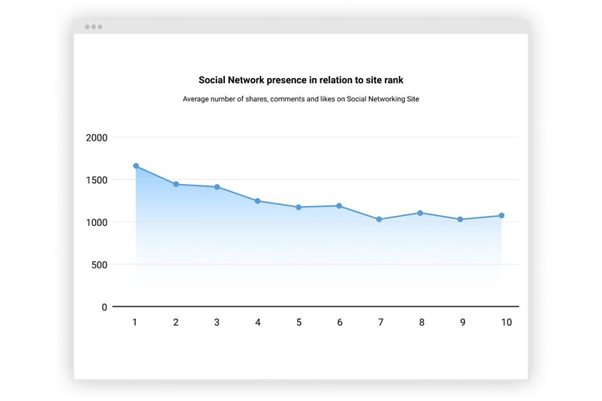
Google Thinks Social Media Sites are Trustworthy
Social media platforms are places with very high trust ratings – let’s check them using MOZ:
- Domain Authority of Facebook is 96/100,
- Instagram 93/100,
- Twitter 94/100.
Sounds like a valuable place to obtain links, right?
Most Links From Social Media are Nofollow Links
However, it also needs to be mentioned that most links from social media are marked with the nofollow attribute, but again: the lack of dofollow links doesn’t mean that the site has no value – we’ll discuss it in the subsequent parts of the article.
Social media links have an indirect impact on your website position. When combined with a good SEO strategy and the knowledge of an experienced specialist, they can really support SEO.
Check out how you can boost your business with our e-commerce SEO services!
SEO Benefits of Social Media Links
Increased Traffic
Redirecting users from social media to valuable blog posts or trending products can often generate significant traffic (checking your performance in Google Analytics, you’ll find it under the “social” label).
But it doesn’t stop there – well-targeted social media content allows you to get valuable traffic with a low bounce rate. This informs Google that your content brings value to users.
What’s more, there are chances that users who saw your brand on social media will look for it in the search engine. This means that social media allows you to gain organic traffic from the search engine.
Often, the users you gain through SEO are at the end of the sales funnel, while those you find through social media are at the beginning, sometimes they don’t even know who you are or what you do. That’s why, users who are curious about a given post may want to find more information on their own, via Google.
Tip: When setting up your social media profiles, remember to provide a link to your website and use relevant keywords. See a well-configured Twitter profile of the Moz tool:
Diversification of Nofollow and Dofollow Links
When link building, it’s important to diversify your link profile: you should link from both dofollow and nofollow sites.
Why? It’s natural. Too many dofollow links – although they are more valuable in theory – will negatively affect your site’s reputation, giving Google a signal that something may be wrong. That’s why social media links can do a great job here as they improve your domain authority while reassuring the algorithms that everything is fine.
Acquisition of New Links Through SM
On the one hand, sharing content on social media generates even more links to your website (good content is, after all, willingly shared by users). On the other hand, by creating valuable content on social media you increase the likelihood that it will reach people from your industry or potential business partners who will post links to your website on their blogs, websites, or profiles.
It’s important to mention that these are not estimations or theories – there are tests confirming the influence of shares on the growing number of links, e.g. the one conducted by Dan Zarrella from HubSpot:
Increase Visibility for Brand Phrases
How to rank high in the search results for brand phrases, while making sure the users don’t reach your competitors?
Create and optimize social media profiles!
And preferably not one, but many. If you want to know how to do it, read our post about SMO, and if you already know – see what such activities can look like in real life. Again, we’ll use the example of the Moz tool.
Outstanding social media profiles and rich snippets are their huge advantage. Note that in the box on the right, Google has prepared a “Profiles” segment with a link to Twitter.
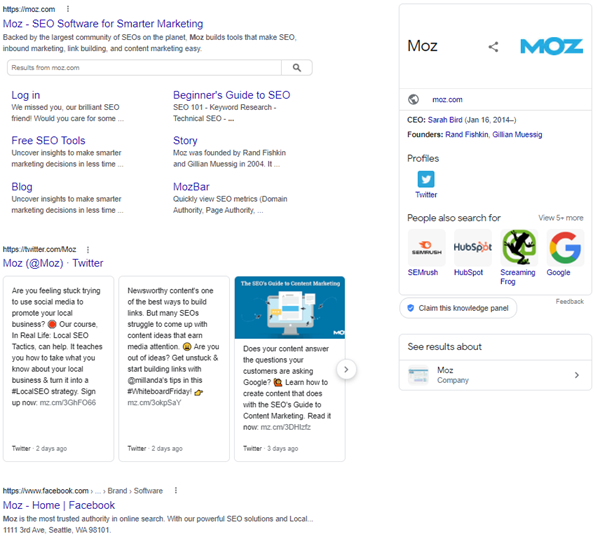
Increased Social Authority Thanks to Credible Backlinks
Many studies (e.g. Optinmonster, Hootsuite) indicate that despite Google’s claims, social media engagement and thriving profiles have a positive impact on websites’ positions.
Neil Patel stated that despite not having a direct impact on search engine rankings, links from social media are seen by Google as reliable, high-quality backlinks and therefore can improve website positions. Moreover, being present on social media makes your company more trustworthy, especially if you allow users to write reviews (e.g. on Facebook).
Possible Acceleration of Indexing
Want to increase the likelihood that Google robots will visit a new website post or a freshly published article? In addition to submitting your content to the indexing queue in Google Search Console, try to share it on social media (especially Twitter).
It might be a good way to inform Google robots about your brand new entry.
What else?
- Improved brand recognition and image
Social media can help you create your brand image.
Interacting with users builds brand awareness, which will pay off, for example, when a user comes across your brand name in the search results and associates it positively thanks to your marketing activities.
- Loyal recipients
Direct relationships with your audience allow you to build a special bond with people. Thanks to it, average customers turn into brand ambassadors who will recommend your services or products further (often in the form of links!).
Take care of the quality of the content you share and its proper localization to ensure that it meets the requirements of the target group. It may even turn out that your social media doesn’t convert because of low-quality content!
- Increased brand credibility
Although it might seem like a trivial argument, presence on mainstream social media (e.g., Facebook) is often proof to potential customers that a company exists and is active.
- More reviews
Did you know that Facebook reviews are displayed in your Google Business Profile listing? This increases its visibility and your brand credibility which translates into increased sales.
- Bigger target group
Different social media platforms have their own target audience that may overlap with yours – by being active on different platforms you reach not one, but many various groups.
- Improved sales (while waiting for the effects of SEO)
If you’re just starting your adventure with SEO and you know it’ll take some time before you notice the first effects, social media may be a good element of your marketing strategy, also when your SEO process brings you the first tangible benefits.
What is the Key to the Effective Promotion of a Website in Social Media? SEO Perspective
Provide High-quality Content
You already know how important valuable content is for SEO. If you don’t have quality texts, take your time to define your audience, the language you’ll use to communicate, and start creating content that sells.
If you already have something to share, don’t wait and get down to business.
This will allow you to attract the attention of your audience and get them interested in your offer. Once they visit your site, you’ll be able to decrease your bounce rate and increase engagement and traffic (including organic traffic!) to your site.
Remember – quality > quantity in this case.
Use Relevant Key Phrases and Tags
As it’s been mentioned above, SMO which stands for Social Media Optimization is an important part of obtaining links from social media.
To optimize your posts, you should tailor keywords and hashtags (e.g. in a Twitter post, photo description on Instagram, or bio) to your content, even if you can’t use these phrases in anchor links.
Diversify Published Content
Google likes diversity.
Make sure the content you share is engaging and fresh, rather than makeshift and created to “accompany” a link. Use images, infographics, or videos – video is extremely valuable according to the algorithms, and at the same time, YouTube itself is a huge search engine, visited by millions of people every day.
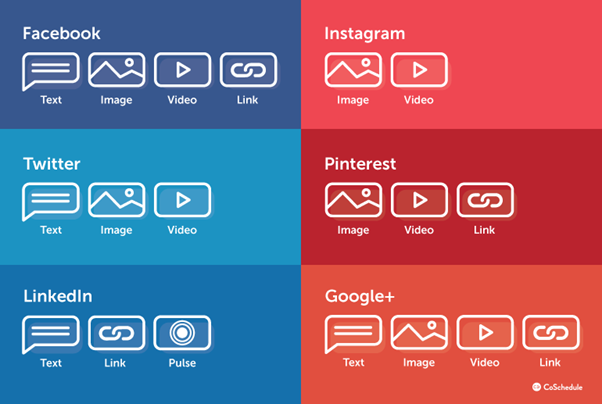
Use Meta Tags
SEO and metadata are a great combination important for social media.
If you want your links to be visible on social media and you want to make sure that users and Google robots see the graphics of your choice, not blurry logos, take advantage of metadata.
Social Media Links and SEO – The Takeaway
According to numerous sources, the engagement of social media users has an impact on SEO.
Although it doesn’t affect website positions directly, it influences a number of factors such as brand recognition, and trustworthiness. So, to answer the question about whether it’s worth linking from social media: it certainly won’t hurt your site, and it can only improve its reputation (both among users and Google).
Social media links are a part of professional, reasonable SEO and link building process.
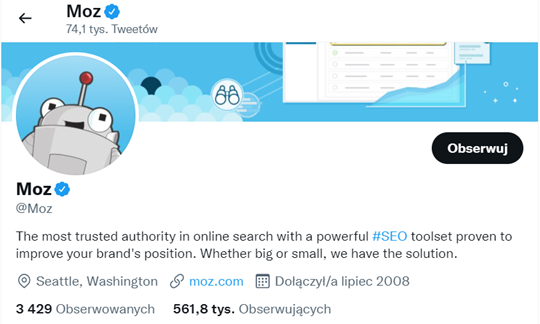
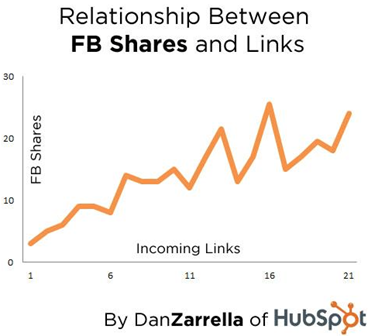




In the simplest terms, the relationship between social media and “SEO” is like an alley-oop in basketball, where social lobs the ball and SEO dunks it. Even though social media signals don’t have a direct impact on search rankings, they affect your “search engine optimization” efforts in primarily four ways:
(i) Increased online visibility and traffic to your website
(ii) Increased authority and brand recognition
(iii) Broader content distribution and longer content lifespan
(iv) Improved local SEO